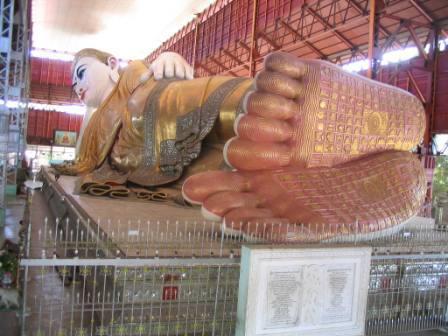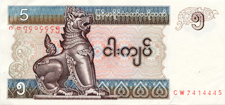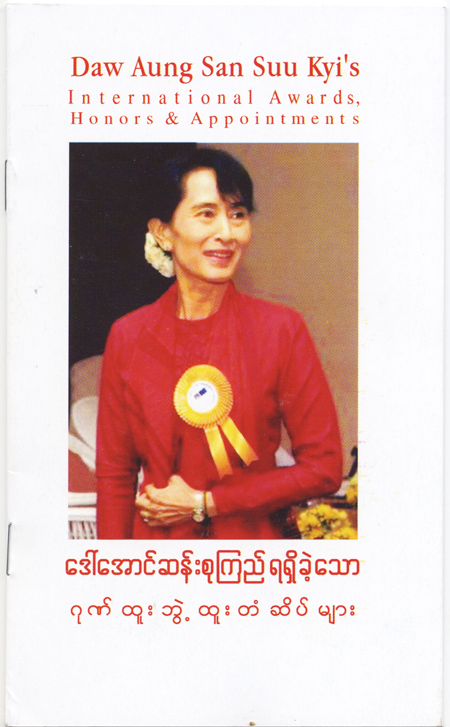
The Column of Lasting Insignificance: June 23, 2012
by John Wilcock
Burma Diary
SATURDAY: Fourteen hours out of LA we stopped in Seoul, banished from the plane and obliged to walk through the airport, go again through security before re-boarding to await departure for Bangkok where we arrived at 1am, two hours late. The hotel, 30 miles away, was supposed to be overnight, but I actually spent less than three hours there before I returned to the airport for the flight to Rangoon, now Yangon. Exhausted, I fell on the hotel steps and injured my knee which was to plague me for the following two weeks. A genial local guide, Patrick Po, welcomed our party of 16, shepherding us to the hotel where Nikki, an effervescent former super nanny gave us a briefing. After which, blessedly to bed at last.
TUESDAY: Crossing the international dateline cost us a day and the pace quickened fast. First stop was to admire the giant reclining lady Buddha (220 feet long, with toenails as big as dinner plates). Apart from a chart of statistics (height of the hairknot 8ft, upper eyelash 1ft) everything was in Burmese, a language composed of loops and whirls and thus hard to learn. Next came the visit to a crowded teahouse where cups of Chinese tea were poured from a constantly refilled thermos on each table. Hundreds of men, no women, filled tables constantly served by a squad of T-shirted Lucky 7 tea boys who deposited plates of hot snacks (50c). Nobody was seen smoking. Our citywide tour passes the high-walled headquarters of Suu Kyi’s NLD party and when Po asks if anyone wants to buy a party T-shirt bearing the lady’s picture, all hands are raised. No army sympathizers here. We were warned not to take photographs of police or military although in actual fact few, if any, were ever seen.

Replying to a reader in the UK’s Guardian who had asked why that paper still referred to Burma rather than the official name of Myanmar, David Marsh said: “Myanmar was chosen by the junta. The name was opposed by Aung San Suu Kyi and her democratically-elected government. Although the UN recognized the name, we take the view that as the country is being run by a regime that seized power illegally, to recognize the name change confers legitimacy upon them…we will keep this policy under close review”.
WEDNESDAY: An early airport departure for Bagan (pop: 7,000), the country’s 11th century capital and the site of thousands of towering stupas, mostly covered in gold, which usually contain Buddhist relics and eventually evolved into the larger pagodas which can be seen everywhere. Stupefied by endless stupas visited during a horse and buggy ride, we soon wearied of having to remove shoes and socks at every occasion. The building of new ones—almost all by individuals or families—was finally banned in 1975, although renewal of older ones is still allowed. Our lovely hotel here is the Thazin Garden whose sign charmingly announces: Sweet Release to Fairyland of Wonders. Palm trees and pink bougainvillea surround the pool, its petals caressing you as you swim. One of our party, an LA-based writer named Scott, wears a different T-shirt each day. Yesterday’s asked: What would Lizbeth Sander do? Today’s is You can’t fight in here: this is the war room.
THURSDAY: As we waited for the ceremony in Myinkaba village I sat on a bench across the street from a monk who, catching my eye, gestured to the sky. Sure enough, ten minutes later it rained. A case of divine wisdom? We were there for the eventually-deluged parade of pre-teenie girls, dressed as queens in white robes, on horseback, accompanied by hundreds of villagers carrying flowers to celebrate the initiation of a batch of new monks which can begin as young as five. Then it was on to Minnnanthu village, where we watched the spokes for wagon wheels being deftly crafted as an old lady holding a baby pulled steadily on an overhead chain that operated the bellows for the iron flange. Renowned for its production of sesame and peanut oil, the village population is a mere 500 but there seemed to be at least that many kids who were well aware that visitors by bus brought gifts. The redoubtable Nikki made them line up as eager little hands reached out for our group’s bounty—candies, crayons, pens, notepads—anything portable and likely to be useful to children who might have never seen a book. The indispensable Nikki, bicycling between the villages, is truly amazing, explaining restaurant menus, keeping everything in order and everybody in line. “Those English nannies” remarked one of our party. “They think all men are bad boys and just need some discipline”.
FRIDAY: Women predominate on Burma’s billboards which line the highways from Mandalay’s airport to town. Graffiti is never seen. Our 30-minute flight would have taken six hours by bus, such is the sorry state of many roads. Crossing the river by boat we were soon ensconced at the Small River Restaurant, presumably named because it wasn’t the Irawaddy… All the party went off on a horse and buggy ride, but as my knee was still causing me trouble, I chose to remain under the trees, watching women carry double loads of buckets of water via a yoke across the shoulders. One young girl carried the buckets while leading a white calf behind her. Only the occasional mango (tha yet thee) dropping from the trees broke the silence but the falls were frequent enough to interrupt lunch when everybody returned. “Surely,” I asked Jeff, our local  guide, “there must be Burmese jokes about people hit by a falling mango?” But he said no, so the table tried to invent one, although the best we could come up with was “What menu item offers advice to escape falling mangoes?” our answer being “Duck” (which happens to be always the most expensive item—about 7000k).
guide, “there must be Burmese jokes about people hit by a falling mango?” But he said no, so the table tried to invent one, although the best we could come up with was “What menu item offers advice to escape falling mangoes?” our answer being “Duck” (which happens to be always the most expensive item—about 7000k).
SATURDAY: Nikki, a witty combination of schoolmarm, comic, and born leader, has us out of the hotel by a welcome 9am to visit a monastery to watch 1,500 young monks, brown robed and barefoot, line up for their final meal of the day (at 11am, breakfast having been hours earlier). It was chastening to note their disciplined array stand silently in rows until the gong allowed them to file into the refectory. As I waited, I thumbed through a guide to Buddhism from an adjoining bookstall. Four Basic Thoughts governed the creed, I read, the first being that Life is suffering. A depressing mantra on which to reflect.
Next, it was the turn of pink-robed, barefoot nuns to welcome us to their nunnery where our group was served lunch: rice, vegetables, beans with unidentified herbs, and pineapple to follow. It’s the custom of our tour company to provide the lunch on such visits but we were denied the opportunity to vary the nuns’ diet by shopping for such savory delights as, say, hot dogs, hamburgers, and fish and chips. Salt, btw, ubiquitous on U.S. tables, is rarely seen here unless asked for.
Atop Mandalay’s highest hill, a glittering palace displays gilded Buddhas around every corner. Like most pagodas, it is  guarded by fiercesomely mythical lions — symbols of strength and power and thus a favorite of the military. This grotesque lion also dominates all the banknotes up to 1000k. The largest denomination, 5000k, stars an elephant, a beast also widely seen, especially around hotel swimming pools. At 800 to the dollar, five kyats is worth about half a U.S.cent.
guarded by fiercesomely mythical lions — symbols of strength and power and thus a favorite of the military. This grotesque lion also dominates all the banknotes up to 1000k. The largest denomination, 5000k, stars an elephant, a beast also widely seen, especially around hotel swimming pools. At 800 to the dollar, five kyats is worth about half a U.S.cent.
SUNDAY: Women held up long bamboo poles acting as safety ‘railings’ for a swaying plank on which we crossed into a boat that took us up the Irrawaddy to inspect the world’s largest uncracked bell (nearly 11 feet tall, weighing 87 tons) near the pagoda at Mingun. Lunch in a classy restaurant beside the river where tankards of draft Tiger beer (1,000k) showed up for the first (and last) time. Back home, most of the rest of the day was spent in the delightful pool but at last, I had the chance to scan some of the dozen multi-colored Myanmar tabloids, so kaleidoscopically colorful as to make Rupert Murdoch’s lurid papers look positively academic. Burmese, as you can see below, is hard to read, this extract from Yangon’s Newsweek apparently concerning ladies of the night.

MONDAY: The highway to the airport is lined every 20 yards for miles with saplings protected by bamboo cages which one day will provide a formidable tree-lined avenue. All Respect, All Suspect reads the sign on the check-through baggage machine. And yet, bottles of water were allowed. From the airport at tiny Heho — a major airbase, in turn, for both the U.S. and Japan in WW2 — we bussed for two hours down narrow dirt roads to Pindaya whose major attraction is a pleasant lake and huge caves in the hills behind. Then on to Kalaw with its colorful market.
TUESDAY: A morning visit to the lively market was supposed to provide us with picnic ingredients for the train ride to Inle Lake. The bad news, rendered by an amusingly apologetic Nikki, was that the railway track was apparently blocked and the train was cancelled. We’d go by bus after a brief visit to yet another pagoda. Then, as my companions took a brief walk down the hill, I sneaked behind the bus to smoke a joint, regaling the party as I returned with exuberant stories about the proficient blue morning glory I’d noticed and pointing out that, just as banana peel (which we’d discussed earlier) during the hippie years the blue flower was also regarded (incorrectly) as a hallucinogen. As I’d kept quiet for most of the tour (due to injured knee, bad hearing) my exuberance surprised even me until I reflected that unlike most people who get stoned to escape reality, my getting high brought me back from my usual out-of-it dreaming state into reality where I could actually connect with those around me. At Inle Lake, almost 3,000 feet above sea level we boarded the characteristic long, narrow boats—all traffic is by boat—in which passengers sit singly behind each other and the prow is high above the water, soon arriving at the gorgeously luxurious Inle Resort , which may well be the nicest hotel I have ever visited.
WEDNESDAY: After what Lewis Carroll would have noted as “a white stone day,” and on the second of our three days at this glorious resort, we set off across the 50-square-mile lake to visit local villages. Suu Kyi is reputed to live somewhere near the lake but our guide has no knowledge of this. Hundreds of boats frequent the lake, the smaller ones in use by young fishermen who stand on one leg, uniquely wrapping the other around the oar (to better deal with entangling weeds) and huge, diesel-powered outboards spraying clouds of water in their wake and transporting people or supplies. Miniscule “islands” composed of a few rushes provide occasional rest stops for some of the thousands of seagulls, with some sporting blue flowers, possibly the water hyacinth. The “main street” of the various villages are wide canals lined with stilted houses some of whose occupants make items out of silk or lotus roots, and one housed small girls who were rolling very small cheroots. The lake itself is getting smaller because the man-made floating islands, anchored by bamboo poles, on which villagers grow vast amounts of tomatoes and other plants eventually become firm land. Soon we leave for home and as a parting gift, our guide gives each of us a booklet listing more than one hundred honors and awards (including the 1991 Nobel Peace Prize) that Suu Kyi will accept during her current visit to Europe. Here is the booklet’s cover.

Video of JW’s tour of Burma will soon be on this website and meanwhile, a new issue of the Ojai Orange (offering a more social-cultural-political view of the country) is being prepared. This will be mailed to all 300 worldwide subscribers but, as usual, will be sent free to any who ask for it. Write to P.O.Box 1359, Ojai, Ca. 93024 and enclose a few stamps if you wish to remain on the permanent mailing list.
